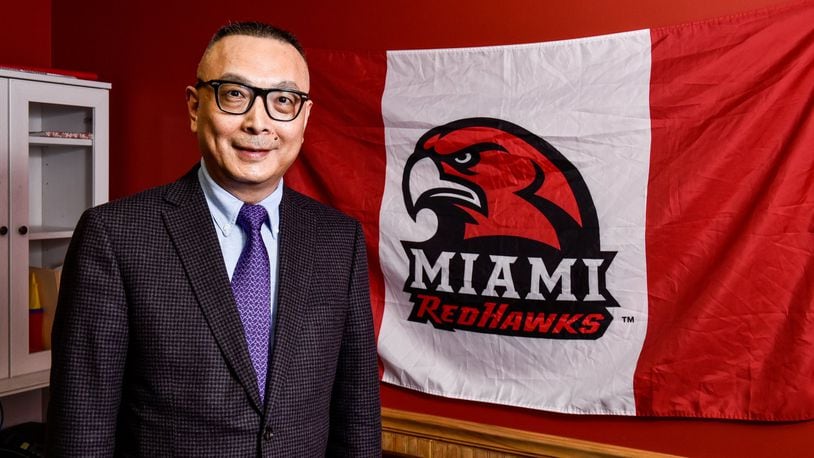Since 1996, while at Renmin University, Zhang helped Chinese students study abroad in the United Kingdom and in Australia.
“Universities in America are world-renowned and we want to give Chinese students a chance to get a world-class education that American universities provide,” he said through his translator Alan Yin, Quest’s U.S. assistant manager.
About six years ago, Zhang met then-Miami University provost and executive vice president for academic affairs Conrado “Bobby” Gempesaw and discussed his idea about a program in which Chinese students would come to Miami University to learn English as well as earn an undergraduate degree. Gempesaw, who is now the president of St. John’s University in New York, suggested they establish an English Language Center at MUM.
According to Zhang, Gempesaw had a common experiences in working with Chinese students and helping them to adjust to campus life but many would leave after their first semester. Zhang said they also discussed setting up accommodations and addressing challenges with food, dining, medical issues as well as people being there for him. As he developed the program, he later met with Middletown Mayor Larry Mulligan and then-city manager Judy Gilleland.
MORE: These local students worked with special needs adults. What they created was beautiful.
He said parents are protective and worry about the students being able to take care of themselves and be independent in a foreign country.
“Many times students who are the only child in families run into challenges,” Zhang said.
“Safety is the first concern of parents and academics are second,” he said. “We make sure campus dorms are absolutely safe and make sure the RAs have close relationships with students so parents can contact them. Our most important job is safety.”
While student safety is their top concern, Zhang said the current political climate has affected the program as 25 to 30 percent of the students are opting to study in Canada.
In August 2013, the first group of about 30 students came to MUM. Since then, another 550 students have come through the ELC, said Jerry Martin, director of the Miami University Regionals English Language Center. Currently, there are about 150 Chinese students in the program.
Quest purchased the former Holiday House at 1209 N. University Blvd., which is adjacent to the MUM campus, as well as an adjacent apartment complex on Park Lane and another apartment complex on Roosevelt Boulevard. The organization employs two chefs and three other kitchen staff which prepares Chinese meals for the students at the Holiday House. In addition, there are also four other full-time employees in the U.S. office to help support the students and arrange tours and other programs.
Zhang said in addition to paying their Miami University tuition and fees, it costs students between $15,000 and $18,000 a year in living and housing expenses. He said there are scholarships available for those who earn good grades.
The ELC also sets up volunteer programs as well as day trips to Cincinnati and Dayton cultural and entertainment venues. When students arrive, the program has its own orientation the students go through before they go through the university orientation.
“Our staff makes sure they understand the local laws and customs, how to use 911 and learn the non-emergency number for police,” Zhang said. “Our students have not had any safety issues arise and most American students are very friendly and have developed long-term friendships.”
Zhang believes this type of model is good for Chinese students and has purchased land near Miami Regionals’ campus in Hamilton for future expansion. Quest also has programs at St. John’s University and just signed an agreement with the University of Manitoba. Zhang is interested in expansion to some other Asian countries. However, he said Miami is their first partner and main focus.
“Our goal is to bring more students to help the Middletown economy,” Zhang said. “We’ve made a lot of good friends in Middletown and hope to share in its successes.”
He said many of the students come from large cities in China and say Middletown is a very quiet place.
Yin said, “we want to let the community know we are here and we want to get more engaged with the community.”
Of the first group of about 30 students enrolled in 2013, 12 have graduated from the Oxford campus, two graduated from Miami Regionals, and six others are continuing in their programs, said Brennan Burks, Miami Regionals public relations and marketing strategy director.
Burks said overall a total of 75 students have graduated, with 15 of those graduating from Miami Regionals’ Hamilton and Middletown campuses. This May, 20 ELC students will be graduating from Oxford campus programs and 12 more will be graduating from Miami Regionals programs.
“It allows international students the opportunity to study at Miami Regionals and live in Middletown,” Martin said. “The international students are very engaged on campus and in the community, collaborating with domestic students.”
“A high number of students continue to earn degrees from Miami Regionals,” Martin said. “They are involved in the city of Middletown and this program allows local students to access individuals from another country without having to study or travel abroad which can sometimes be cost prohibitive.”
He said understanding and experiences with individuals from other countries is particularly important for all majors, especially commerce majors who must work in a global economy.
About the Author
